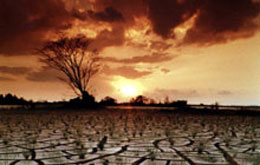Africa will suffer dearly from global warming
Africa will suffer dearly from global warming
mongabay.com
November 5, 2006
Already the world’s poorest continent, Africa will suffer dearly from global warming unless greenhouse gas emissions are cut by an eventual 80 percent, according to a report from the U.N. issued on the eve of a global climate conference in Nairobi, Kenya.
The study, released by the Secretariat of the UN Framework Convention on Climate Change (UNFCCC) and based on data from such agencies as the UN Environment Programme (UNEP) and the World Meteorological Organization (WMO), found that 30 percent of Africa’s coastal infrastructure could be flooded by rising sea levels, including settlements in Senegal, Gambia and Egypt. The report warned that 25-40 percent of key habitats could be lost in the next 80 years, dooming much of the continent’s biodiversity, while yields for certain crops in Sudan, Ethiopia, Eritrea, Zambia, Ghana, and the Gambia will fall.
Already Bad but Looking Worse
|
|
Climate change is already evident in Africa. According to the report, the continent has warmed by 0.7 degrees C during the 20th century, while rainfall has dropped by 25 percent over the Sahel during the past 30 years and 2.4 percent per decade in the tropical rainforests regions of West Africa and north Congo since the mid-1970s. Droughts have worsened in the Sahel, the Horn of Africa and Southern Africa since the end of the 1960s.
“Consecutive dry years with widespread disruption are reducing the ability of the society to cope with droughts by providing less recovery and preparation time between events,” said the report.
Climate models project a two to six degree C increase in mean surface temperatures in Africa by 2100 and continuing decline in precipitation, including a 10 to 25 percent drop over northern parts of Africa in the months of June, July and August and a 10 to 60 per cent decline in March, April and May over the next 50 years. While West Africa may see an increase in rainfall, the report says that by 2025 some 480 million Africans “could be living in water scarce or water stressed areas.”
“Climate change is underway and the international community must respond by offering well-targeted assistance to those countries in the front-line which are facing increasing impacts such as extreme droughts and floods and threats to infrastructure from phenomena like rising sea levels,” said UNEP Executive Director Achim Steiner.
“Part of the action, part of the adaptation response and part of this responsibility to Africa, must include significant improvements in Africa’s climate and weather monitoring capabilities. Then countries on the Continent can better tailor their response in areas from agriculture to heath care and international donors can better understand Africa’s needs now, and in the future,” added Steiner.
The report said that the world must prepare for climate change while at the same time working to drastically reduce emissions. Industrialized countries should take the lead, added the report.
The report comes as the 189 parties to the 1992 U.N. climate treaty are meeting in Nairobi to discuss emissions targets and mitigation strategies. One promising initiative under consideration could compensate African and other developing countries for protecting their forests in exchange for carbon credits. The plan could be worth billions to some of the world’s poorest countries.
RELATED
Africa Heats Up — climate change threatens future of the continent
The greatest and saddest irony of this dark fate projected for the continent is that while Africa has the world’s lowest levels of greenhouse gas emissions, contributing the least to global climate change, it has been forced to bear the brunt of the phenomenon.
